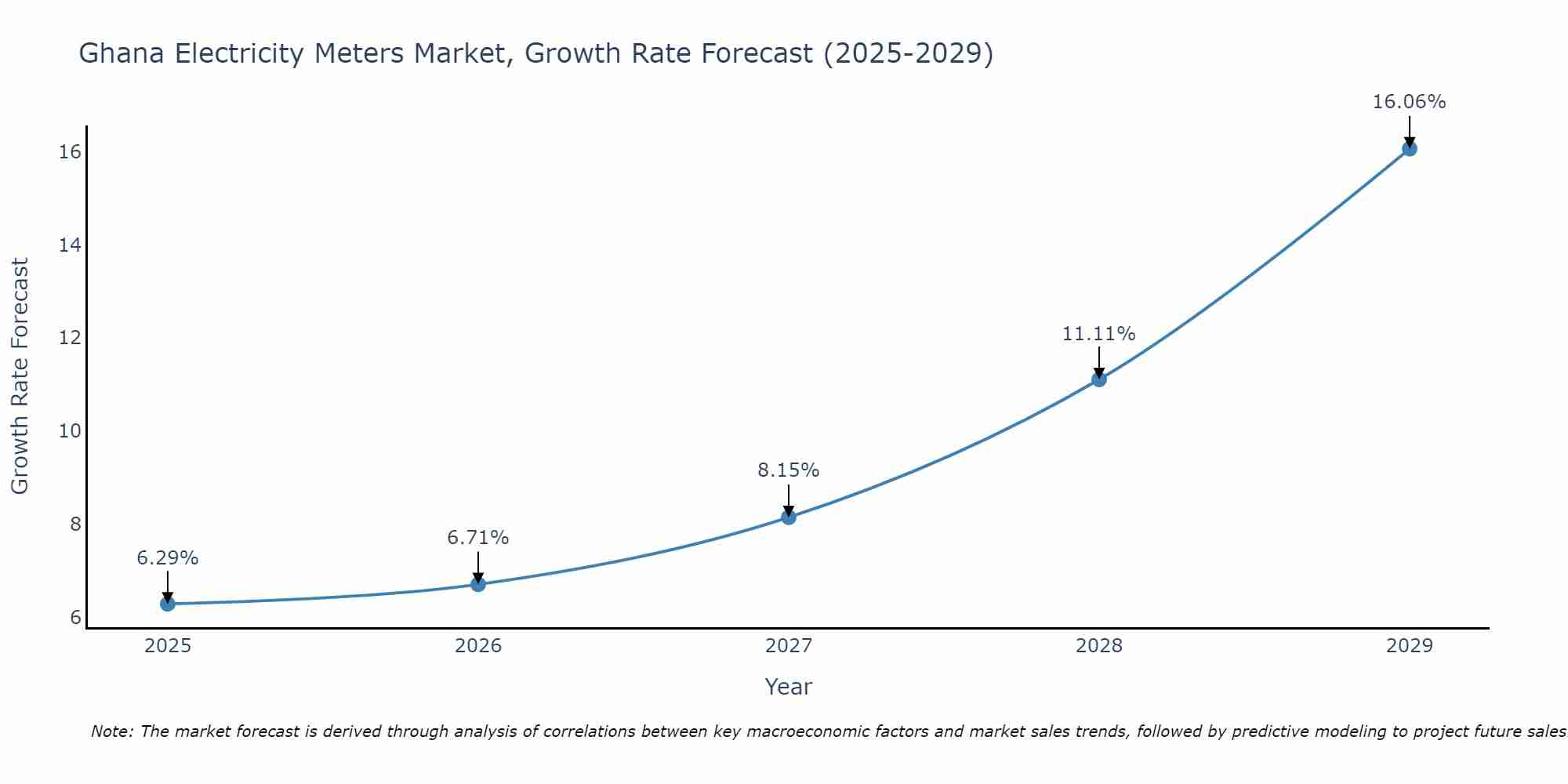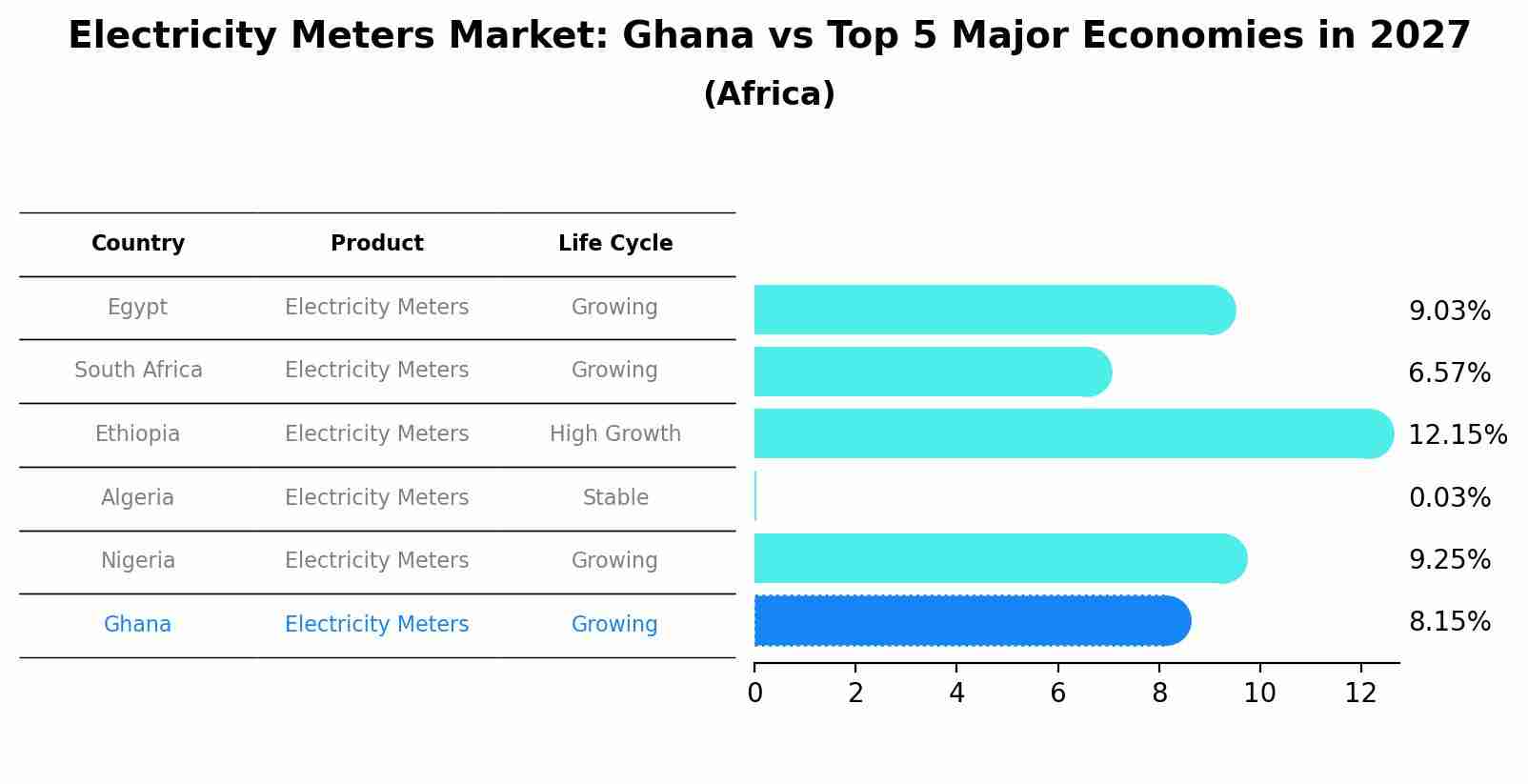Ghana Electricity Meters Market (2025-2031) Outlook | Trends, Companies, Value, Size, Share, Forecast, Analysis, Industry, Revenue & Growth
| Product Code: ETC432952 | Publication Date: Oct 2022 | Updated Date: Jul 2025 | Product Type: Market Research Report | |
| Publisher: 6Wresearch | Author: Summon Dutta | No. of Pages: 75 | No. of Figures: 35 | No. of Tables: 20 |
Ghana Electricity Meters Market Size Growth Rate
The Ghana Electricity Meters Market is likely to experience consistent growth rate gains over the period 2025 to 2029. The growth rate starts at 6.29% in 2025 and reaches 16.06% by 2029.

Electricity Meters Market: Ghana vs Top 5 Major Economies in 2027 (Africa)
The Electricity Meters market in Ghana is projected to grow at a growing growth rate of 8.15% by 2027, within the Africa region led by Egypt, along with other countries like South Africa, Ethiopia, Algeria and Nigeria, collectively shaping a dynamic and evolving market environment driven by innovation and increasing adoption of emerging technologies.

Ghana Electricity Meters Market Synopsis
The Ghana Electricity Meters Market is experiencing steady growth due to increasing urbanization, industrialization, and government initiatives aimed at improving access to electricity. The market is primarily driven by the need for accurate billing and revenue collection in the electricity sector. Prepaid meters are gaining popularity among consumers for their cost-effective and convenient payment options. Key players in the market are focusing on developing advanced metering technologies to enhance energy efficiency and reduce losses. Additionally, the government`s efforts to modernize the electricity distribution infrastructure and promote renewable energy sources are expected to further propel the market growth. Overall, the Ghana Electricity Meters Market presents lucrative opportunities for industry participants to innovate and expand their market presence.
Ghana Electricity Meters Market Trends
The Ghana Electricity Meters Market is experiencing a trend towards the adoption of smart meters, driven by government initiatives to modernize the electricity infrastructure and improve efficiency. Smart meters enable remote monitoring and real-time data collection, allowing for better management of electricity usage and more accurate billing. Additionally, there is a growing demand for prepaid meters as they provide consumers with better control over their electricity expenses and help utilities in reducing revenue losses due to non-payment. Integration of advanced technologies such as IoT and data analytics in electricity meters is also gaining traction, enabling utilities to offer value-added services and optimize grid operations. Overall, the Ghana Electricity Meters Market is moving towards more advanced, efficient, and customer-centric solutions to meet the evolving needs of both consumers and utilities.
Ghana Electricity Meters Market Challenges
In the Ghana Electricity Meters Market, some of the challenges faced include issues of meter tampering and electricity theft, inadequate metering infrastructure in some areas leading to inaccurate billing, lack of standardized regulations and enforcement mechanisms, and the high cost of purchasing and installing meters for both consumers and utility companies. Additionally, there are issues related to meter reading and data management, as well as the need for continuous maintenance and upgrades of metering systems to ensure efficiency and accuracy. These challenges contribute to revenue losses for utility companies, unreliable billing practices, and difficulties in managing electricity consumption and distribution effectively in Ghana.
Ghana Electricity Meters Market Investment Opportunities
The Ghana Electricity Meters Market offers various investment opportunities due to the increasing demand for energy management solutions in the country. With the government prioritizing initiatives to improve access to electricity and reduce energy losses, there is a growing need for advanced metering infrastructure and smart meters. Investors can explore opportunities in manufacturing and supplying prepaid meters, smart meters, and other energy management systems to utility companies and residential consumers. Additionally, investing in metering technology development and innovation to meet the specific needs of the Ghanaian market can be a lucrative opportunity. Collaborating with local utilities and government agencies to modernize the metering infrastructure and improve energy efficiency can also be a strategic investment in the Ghana Electricity Meters Market.
Jordan Agar Market Government Policies
The Ghanaian government has implemented various policies aimed at improving the electricity meters market in the country. One significant policy is the implementation of the Automatic Meter Reading (AMR) system, which allows for the remote monitoring of electricity consumption and accurate billing. Additionally, the government has introduced initiatives to promote the use of prepaid meters to enhance efficiency in electricity distribution and consumption. Furthermore, the government has set regulations to ensure the quality and reliability of electricity meters, as well as to prevent tampering and fraud. These policies aim to modernize the electricity meters market in Ghana, improve service delivery, and promote energy efficiency in the country`s electricity sector.
Ghana Electricity Meters Market Future Outlook
The future outlook for the Ghana Electricity Meters Market appears promising, driven by factors such as increasing urbanization, population growth, and government initiatives to improve access to electricity. The market is expected to witness steady growth due to the rising demand for electricity meters in both residential and commercial sectors. Additionally, the increasing focus on energy efficiency and the adoption of smart meters are likely to further boost market growth. The introduction of innovative technologies and advanced features in electricity meters is anticipated to drive market expansion and create opportunities for market players to offer customized solutions. Overall, the Ghana Electricity Meters Market is poised for growth in the coming years, supported by ongoing infrastructure development and efforts to modernize the energy sector.
Key Highlights of the Report:
- Ghana Electricity Meters Market Outlook
- Market Size of Ghana Electricity Meters Market, 2024
- Forecast of Ghana Electricity Meters Market, 2031
- Historical Data and Forecast of Ghana Electricity Meters Revenues & Volume for the Period 2021 - 2031
- Ghana Electricity Meters Market Trend Evolution
- Ghana Electricity Meters Market Drivers and Challenges
- Ghana Electricity Meters Price Trends
- Ghana Electricity Meters Porter's Five Forces
- Ghana Electricity Meters Industry Life Cycle
- Historical Data and Forecast of Ghana Electricity Meters Market Revenues & Volume By Type for the Period 2021 - 2031
- Historical Data and Forecast of Ghana Electricity Meters Market Revenues & Volume By Single Phase for the Period 2021 - 2031
- Historical Data and Forecast of Ghana Electricity Meters Market Revenues & Volume By Three Phase for the Period 2021 - 2031
- Historical Data and Forecast of Ghana Electricity Meters Market Revenues & Volume By Analog for the Period 2021 - 2031
- Historical Data and Forecast of Ghana Electricity Meters Market Revenues & Volume By Smart for the Period 2021 - 2031
- Historical Data and Forecast of Ghana Electricity Meters Market Revenues & Volume By Application for the Period 2021 - 2031
- Historical Data and Forecast of Ghana Electricity Meters Market Revenues & Volume By Residential for the Period 2021 - 2031
- Historical Data and Forecast of Ghana Electricity Meters Market Revenues & Volume By Commercial for the Period 2021 - 2031
- Historical Data and Forecast of Ghana Electricity Meters Market Revenues & Volume By Industrial for the Period 2021 - 2031
- Historical Data and Forecast of Ghana Electricity Meters Market Revenues & Volume By Others for the Period 2021 - 2031
- Ghana Electricity Meters Import Export Trade Statistics
- Market Opportunity Assessment By Type
- Market Opportunity Assessment By Application
- Ghana Electricity Meters Top Companies Market Share
- Ghana Electricity Meters Competitive Benchmarking By Technical and Operational Parameters
- Ghana Electricity Meters Company Profiles
- Ghana Electricity Meters Key Strategic Recommendations
Frequently Asked Questions About the Market Study (FAQs):
- Single User License$ 1,995
- Department License$ 2,400
- Site License$ 3,120
- Global License$ 3,795
Search
Thought Leadership and Analyst Meet
Our Clients
Related Reports
- Afghanistan Rocking Chairs And Adirondack Chairs Market (2026-2032) | Size & Revenue, Competitive Landscape, Share, Segmentation, Industry, Value, Outlook, Analysis, Trends, Growth, Forecast, Companies
- Afghanistan Apparel Market (2026-2032) | Growth, Outlook, Industry, Segmentation, Forecast, Size, Companies, Trends, Value, Share, Analysis & Revenue
- Canada Oil and Gas Market (2026-2032) | Share, Segmentation, Value, Industry, Trends, Forecast, Analysis, Size & Revenue, Growth, Competitive Landscape, Outlook, Companies
- Germany Breakfast Food Market (2026-2032) | Industry, Share, Growth, Size, Companies, Value, Analysis, Revenue, Trends, Forecast & Outlook
- Australia Briquette Market (2025-2031) | Growth, Size, Revenue, Forecast, Analysis, Trends, Value, Share, Industry & Companies
- Vietnam System Integrator Market (2025-2031) | Size, Companies, Analysis, Industry, Value, Forecast, Growth, Trends, Revenue & Share
- ASEAN and Thailand Brain Health Supplements Market (2025-2031) | Strategy, Consumer Insights, Analysis, Investment Trends, Opportunities, Growth, Size, Share, Industry, Revenue, Segments, Value, Segmentation, Supply, Forecast, Restraints, Outlook, Competition, Drivers, Trends, Demand, Pricing Analysis, Competitive, Strategic Insights, Companies, Challenges
- ASEAN Bearings Market (2025-2031) | Strategy, Consumer Insights, Analysis, Investment Trends, Opportunities, Growth, Size, Share, Industry, Revenue, Segments, Value, Segmentation, Supply, Forecast, Restraints, Outlook, Competition, Drivers, Trends, Demand, Pricing Analysis, Competitive, Strategic Insights, Companies, Challenges
- Europe Flooring Market (2025-2031) | Outlook, Share, Industry, Trends, Forecast, Companies, Revenue, Size, Analysis, Growth & Value
- Saudi Arabia Manlift Market (2025-2031) | Outlook, Size, Growth, Trends, Companies, Industry, Revenue, Value, Share, Forecast & Analysis
Industry Events and Analyst Meet
Whitepaper
- Middle East & Africa Commercial Security Market Click here to view more.
- Middle East & Africa Fire Safety Systems & Equipment Market Click here to view more.
- GCC Drone Market Click here to view more.
- Middle East Lighting Fixture Market Click here to view more.
- GCC Physical & Perimeter Security Market Click here to view more.
6WResearch In News
- Doha a strategic location for EV manufacturing hub: IPA Qatar
- Demand for luxury TVs surging in the GCC, says Samsung
- Empowering Growth: The Thriving Journey of Bangladesh’s Cable Industry
- Demand for luxury TVs surging in the GCC, says Samsung
- Video call with a traditional healer? Once unthinkable, it’s now common in South Africa
- Intelligent Buildings To Smooth GCC’s Path To Net Zero


















